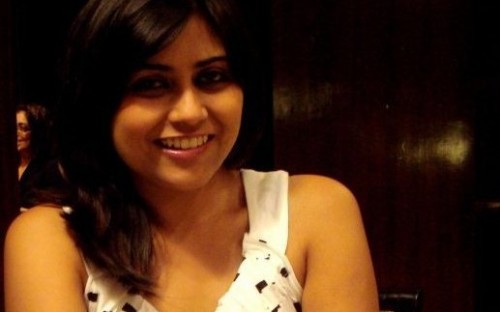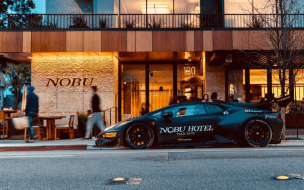In the Phoenix Blend café, based a minute’s walk from Old Street, London’s tech start-up hub, paper is dead. Welcome to the world of tech.
“A lot of retailers are talking about this tech, but haven’t been able to crack it,” says Neha Jainve. She’s one of the founders of Wallet Circle, the start-up which provides the devices, software and stores customers’ data, and an MBA.
By merging the centuries-old practice of selling food and clothing with new innovations, Neha believes her venture has the potential to transform the way consumers use smartphones.
She is not the only one. There is a revolution at the tills, with banks, telecom operators and technology groups all scrambling to sign up shoppers.
But Wallet Circle has potential, enough to win a spot on the Sirius program, a leading UK accelerator backed by the British government.
The company has already signed on 10 retailers, mostly clustered in east London, and has its eyes set on large food and coffee chains Pod and Caffè Nero. But the tech is suited to a wide range of industries and Neha plans to expand into the world of fashion.
She is speaking from Wall Circle’s base on City Road, a free office space provided by Sirius along with a cash injection of £42,000. Like a growing number of technology entrepreneurs, she has been lured from overseas to Britain by financial incentives and market potential.
Wallet Circle was founded in India by a gaggle of MBA and master’s graduates who have worked in companies like Qualcomm and Cisco.
“People are open to listening to technology companies [in London],” says Neha, who spent three years working at Sony Entertainment Television. “In India we faced a huge challenge in pushing our product forward. People are not as open to tech and the market is very mature.”
She handles the marketing, sales and lead generation, while co-founders Manas Abichandani and Neetesh Gupta drive the business and product development.
Marketing is a seemingly a perfect fit for a former student of one of India’s best marketing institutes. Neha graduated from the MBA program at Mudra Institute of Communications in Ahmedabad in 2011.
“It has helped me a lot,” she says of the MBA. “I know how to take things to the next level. I do all of the planning and execution, and the MBA has helped me take things from end to end.”
Promoting Wallet Circle may be the key to overcoming the company’s two biggest challenges: convincing retailers to buy into their tech, and convincing consumers to use their products.
“The big challenge is to get customers to download our app,” says Neha. This is the same problem that retailers face. “A lot of fashion retailers say they have difficulty getting customers to download their app [too].”
But Wallet Circle is anticipating downloads of its app to have doubled by the end of February this year. It is available on both Android and through Apple’s App Store. “There is a need to replace the paper cards,” says Neha.
If there is a need, growth could be rapid. The value of goods and services purchased using mobile phones is expected to almost triple from £4.8 billion in 2013 to £14.2 billion in 2018, according to the Centre for Economic and Business Research, opening up a way for Wallet Circle to encourage consumers to use digital loyalty cards alongside their purchases.
“The drop rate is almost negligible,” says Neha, referring to a measure of how active users are once they have downloaded the Wallet Circle app. “But the biggest challenge is to make them aware the product exists.”
Wallet Circle may soon be waging war on all forms of paper. “There are a lot of areas we can expand into,” says Neha.
She points to the potential to move into healthcare, where patients could access doctors’ prescriptions through their mobiles, for instance, or supplying digital receipts for fashion retailers which may help facilitate and authenticate customer returns.
“We see a clear gap,” she enthuses. Neha reckons they can sign on another 10 retail stores by March, but by targeting large food chains like Costa Coffee and Pret a Manger that goal can be easily exceeded. “If you get one [chain] you get ten stores instantly.”
The other growth area for Wallet Circle is in big data. As buzz words go, this is overused – but retailers in particular have been able to benefit from gleaning large sets of their consumers’ data. Companies use analytics to identify shopping trends and inform sales strategies.
According to a widely-respected study conducted by McKinsey & Company, the consultancy, retailers using big data have the potential to increase operating margins by more than 60%.
Wallet Circle offers a dashboard for companies that sign up, which could provide detailed information about customers using the app, such as stamps collected and frequency of purchases.
“The data we have collected shows there is a clear drop – a lot of customers are visiting stores and not are coming back,” says Neha.
The company gets devices that use iBeacon technology – Apple tech that extends location services – from suppliers and places them in retail stores. This enables smartphones to connect virtually with the devices, to transmit information.
Wallet Circle holds the data, says Neha, and offers it to clients who pay a monthly subscription free (£20 for a basic package) to access the data. More detailed insights are expected to be offered to fashion retailers, at a higher price.
Landing an initial set of clients was difficult, but retailers warmed to the idea once they saw competitors using the technology. “They are open to adapt,” says Neha.
There are opportunities to expand this service into other loyalty campaigns, such as shops’ “bring a friend” marketing strategies, where customers are offered rewards for encouraging others to sign up to certain schemes. “Most of the cafes [we work with] are interested in this feature,” Neha says.
Things get exciting when you consider the potential to move into big retailers, such as supermarkets.
The UK’s largest – such Tesco, Sainsbury and Morrison – all operate loyalty card schemes. The analytics business that helped to create loyalty scheme Tesco Clubcard, Dunnhumby, has reportedly been valued at between £1 billion and £2 billion.
For now, that is a long way off. Wallet Circle is gearing up for a potential seed round of £300,000.
Funding may be easier to come by in London. Research by London & Partners which is based on data from CB Insights, a research firm, show that early-stage tech firms in London raised a record $1.021 billion from venture capital firms in the first three quarters of 2014 – a 10-fold increase on the amount raised by tech start-ups four years ago in 2010.
“Once we get funding we’ll look to start phase two,” says Neha – targeting fashion and electronics retailers.
RECAPTHA :
46
26
2e
b3








